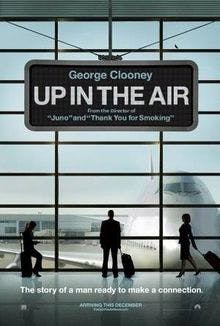Editor’s Note: With the Academy Awards drawing near, TLNT asked a number of prominent thought leaders to write about their favorite movie with a management or HR theme. We’ll feature one a day up to the Oscar ceremony on Feb. 27.
By Fran Melmed
Let’s just get this out of the way, shall we?
Would I want to be laid off by George Clooney? Hell, yeah.
Would I give up my severance for the opportunity? Probably; I’m not above that.
Would I think less harshly of my company’s layoffs if he were doing the dirty work? Possibly. I mean, c’mon…it’s George Clooney we’re talking about, people. If my company could wrangle attention from this level of heart-throbbing talent, I’d have to give the whole process some props.
Now that I got the fantasy portion of this out of the way [poof!], let’s get down to business — the business of layoffs.
In case you missed it, George Clooney’s brought his characteristic dash to layoffs in the movie Up in the Air. He plays Ryan Bingham, a high-flyin’ layoff artist, hired by corporations too spineless to deliver the bad news themselves.

The concept got me thinking of firing and layoffs, of which we’ve been reading or personally experiencing far too much these last few years.
This isn’t about the layoffs that a company arrives at due to harsh economic times and after exhausting other alternatives, like change in leadership, process improvement, hiring and salary freezes, temporarily cutting salaries, and work furloughs. It’s about seizing layoffs as a simple solution to a complex problem ? as in an across-the-board 10 percent riff to quickly cut costs.
Let me give you three very straightforward reasons I don’t like them. Feel free to refute or add to them as you wish or see fit:
- Reason #1: They’re inhumane. In Up in the Air, the young, female upstart determines that companies can save money by laying off via video conferencing. Uber-efficiency! Clooney, because he’s Clooney and we can never really be allowed to hate him, throws down his cloak of integrity (and his mileage card, which would soon be worthless if technology held sway) and insists that’s no way of doing business. There’s honor in laying people off face-to-face, tissue box properly positioned in front of you.
Well, I tell you there are plenty of managers and HR pros who would kill to implement that policy, because laying people off is damn hard, no matter how well executed. It takes a toll on those on both sides of the table. And those who bear the message are often play pieces too ? not the ones who engineered the layoff or influenced consideration of alternative cost-savings efforts.
- Reason #2: They’re cowardly. Tell me you can’t think of someone who was laid off who should’ve been let go for lackluster performance long ago, or of someone else who got caught up because of the formulaic approach and the head count reduction required. Layoffs are the lazy manager’s performance management system, used to weed out poor performers and suggest a high performance culture. Layoffs done in this way may offset survivor’s guilt, but they destroy the credibility of the company’s talent processes and equate layoffs with the shame and embarrassment that affect 46% of unemployed Americans today. And if you’ve experienced a layoff, you know about …
- Reason #3: They stick in a company’s craw. It’s not just the too-much-work, too-few-people scenario. That’s an everyday fact of corporate life. And it’s not the loss of focus while everyone tries to figure out who’s next on the chopping block, or even the survivor’s guilt and subsequent lack of engagement that takes years to restore. It’s about the severing of the company promise — the hidden costs of layoffs.
Yes, layoffs can be a necessary part of keeping a business alive, and yes, companies rebound from them. But once a company uses layoffs to manage the numbers, employees know they are just a number and that the leadership who asks them to give their all is not willing to give them even 5-10 percent.
That’s a problem not even the dreamy George Clooney can fix.
http://www.youtube.com/watch?v=z05W0vS0N58
Regular TLNT contributor Fran Melmed writes on her Free-Range Communication blog.
